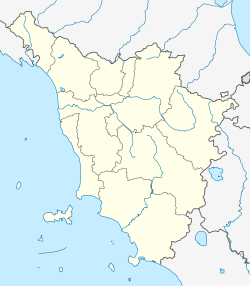Colle di Val d'Elsa
Colle di Val d'Elsa or Colle Val d'Elsa is a town and comune in Tuscany, Italy, in the province of Siena. It has a population of c. 20,000 inhabitants (2005). Its name in Italian means "Hill of Elsa Valley", where "Elsa" is the name of the river which crosses it. Today, Colle di Val d'Elsa is internationally renowned for the production of crystal glassware and art, largely produced in the industrial lower town.
Colle di Val d'Elsa | |
|---|---|
| Comune di Colle di Val d'Elsa | |
 | |
| Coordinates: 43°24′N 11°08′E / 43.400°N 11.133°E | |
| Country | Italy |
| Region | Tuscany |
| Province | Siena (SI) |
| Government | |
| • Mayor | Paolo Canocchi |
| Area | |
| • Total | 92 km2 (36 sq mi) |
| Elevation | 141 m (463 ft) |
| Population (30 June 2017)[2] | |
| • Total | 21,604 |
| • Density | 230/km2 (610/sq mi) |
| Demonym | Colligiani |
| Time zone | UTC+1 (CET) |
| • Summer (DST) | UTC+2 (CEST) |
| Postal code | 53034 |
| Dialing code | 0577 |
| Patron saint | St. Martialis and St. Albert of Chiatina |
| Saint day | July 1 |
| Website | Official website |


History
changeThe area was settled by man from at least the 4th millennium BC,. In 1269 it was the seat of a famous battle during the wars of Guelphs and Ghibellines and in 1479 it was attacked by Neapolitan soldiers. From the 14th century it was under the control of the city of Florence and the Grand Duchy of Tuscany until the unification of Italy in 1860. In the 20th century it became an important industrial town. During World War II it was bombed by Allied aircraft. The oldest part of the town is the "colle alta", the higher part, with a well preserved medieval center. The city is also famous as the birthplace of sculptor and architect Arnolfo di Cambio.
References
change- ↑ "Superficie di Comuni Province e Regioni italiane al 9 ottobre 2011". Italian National Institute of Statistics. Retrieved 16 March 2019.
- ↑ "Popolazione Residente al 1° Gennaio 2018". Italian National Institute of Statistics. Retrieved 16 March 2019.
Other websites
change- Official website
- Official tourist information website Archived 2009-03-12 at the Wayback Machine


